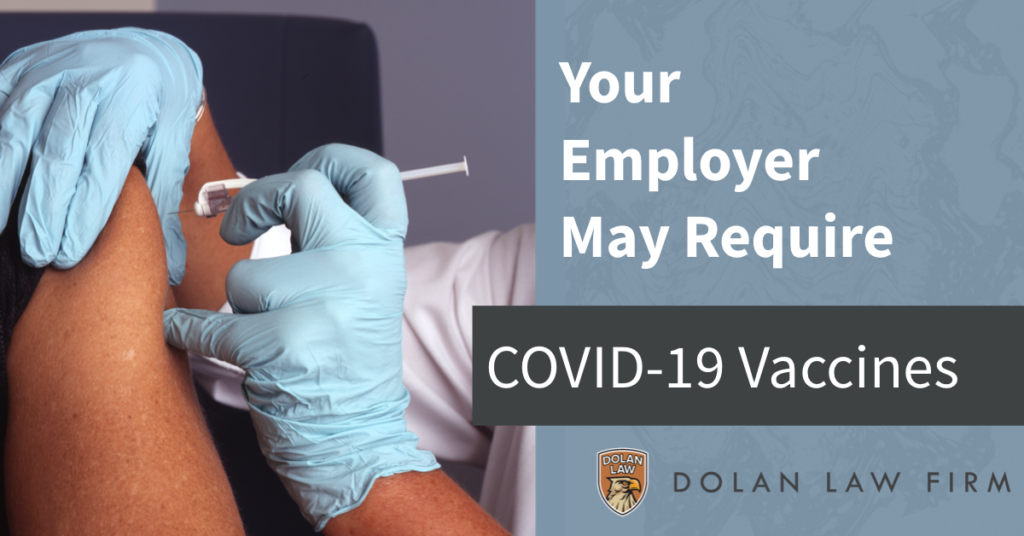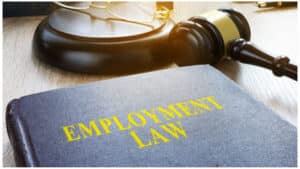Written By: Christopher B. Dolan and Emile A. Davis
This week’s question comes from Giuseppe J. in Orinda: I run a small business. Having survived the worst of this pandemic, I am reopening my store soon. Some of my staff have received the COVID-19 vaccination, but not all of them. For the safety of all of the employees, and to protect the public and selfishly, my own potential liability and health, I would like to require all of my employees to be vaccinated in order to return to the worksite. Is that something that I can do without breaking the law?
Dear Giuseppe: Thank you for this important question. As vaccines become widely available and more businesses are reopening, this question will affect employees and business owners throughout California. Generally, pursuant to both federal Equal Employment Opportunity Commission (EEOC) guidance, as well as the California Department of Fair Employment and Housing (DFEH), an employer may require an FDA approved COVID-19 vaccine as a condition of employment or return to the workplace. However, there are several areas to pay special attention to and/or which may allow an exemption to individual employees.
Disability Accommodation
A qualified individual with a disability may be entitled to an exemption from an employer required vaccine policy. The FEHA requires employers to make reasonable accommodations to an employees’ known disabilities. If an employee objects to vaccination on a disability related basis, the employer must engage in an interactive process to reasonably accommodate the employee. If an accommodation is available that does not create an undue hardship on the employer, it must be provided to the disabled employee. However, if the employee cannot perform the essential functions of their position in a manner that doesn’t endanger the health or safety of others, even with reasonable accommodations, the employer may exclude the employee from the workplace.
Religious Accommodation
If an employee objects to vaccination on the basis of a sincerely held religious belief or practice, the employer must reasonably accommodate the employee. The accommodation analysis is not as stringent as with disability. Unless specifically requested by the employee, a religious based accommodation is not considered reasonable if such accommodation results in the segregation of the individual from other employees or the public. If the employer shows that an accommodation imposes an undue hardship, the employer may exclude the employee from the workplace.
But I Don’t Trust the Vaccine — Employee Refusal
Some people are afraid of, or uncomfortable getting the vaccine. If an employee refuses to be vaccinated with an FDA-approved COVID-19 vaccine but does not have a disability reason or sincerely held religious reason for not being vaccinated, the employer does not have to accommodate that employee. The employee may be refused access to the worksite.
Employer Inquiry
As part of returning to work, employers may seek limited medical information. Employers may generally ask their employees entering a workplace whether they are experiencing COVID-19 symptoms and/or require proof of vaccination.
Requesting proof of vaccination is not a disability-related inquiry, religious creed-related inquiry, or a medical examination since there are other unprotected reasons a person may not be vaccinated. However, because such documentation could potentially include disability related medical information, an employer should specifically omit any other medical information from that documentation. Importantly, if a mandatory vaccine policy is enacted at a workplace, information obtained would be considered a confidential medical record and that information must be kept private and maintained separately from regular personnel files.
The scope of permissible inquiry may change over time. As cases decrease or increase, these standards could change — employers should rely on the CDC and other public health authorities for guidance.
If you would like further guidance as to the DFEH or EEOC, the following links may be helpful.
- DFEH Vaccine Guidance CLICK HERE
- EEOC Guidance CLICK HERE
Thank you, Giuseppe, for the opportunity to discuss this important and emerging legal issue.










